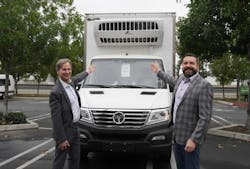GreenPower delivers first EV refrigerated box trucks to UC San Diego
The University of California San Diego, which earlier this week announced installation of a large-scale battery storage system on campus, has now received its first all-electric refrigerated box trucks.
Canadian vehicle manufacturer GreenPower Motor has delivered its those EV Star refrigerated box trucks to the southern California campus. According to the company, the refrigerated box truck is designed for the medium and heavy-duty delivery market and has a payload of up to 5,000 pounds.
The truck’s refrigerator unit is powered directly by the high-voltage battery, making it 20-percent more efficient and 10 percent lighter than comparable low-voltage units currently available in the U.S., GreenPower says.
The EV comes with a battery pack of 118 kWh and offers a range of up to 150 miles. It can also be charged up to 19.2 kW using a standard Level 2 J1772 protocol or 60kW using a DC fast charge, the company notes. Additionally, the truck is equipped with a liftgate, a 16-foot insulated and lined box and an energy-efficient cooling system.
“More payload and longer range makes the EV Star Refrigerated Box Truck a real game-changer for the transportation of goods that require refrigeration," Claus Tritt, Vice President of Medium Duty & Commercial Vehicle Sales at GreenPower, said. "Utilizing GreenPower's EV Star cab and chassis and working with our partner Lion Truck Body, we can configure the vehicle to meet the customer's requirements while integrating all the systems and electrical requirements into our vehicle."
GreenPower's all-electric commercial vehicles are eligible for up to $40,000 in tax credits under the Inflation Reduction Act. These vehicles also qualify for California's HVIP program, which has funding of $250 million, and the New Jersey ZIP program, which will open soon with funding of $90 million.
"We estimate the refrigerated trucking total addressable market in North America will be more than $5.9 billion by 2028. As operators are electrifying their fleets, GreenPower will see significant growth in the marketplace with this innovative product," Tritt added.
Earlier in the week, UC San Diego contracted developer Smartville to provide its MOAB energy storage to store solar energy from a 200-kW rooftop solar array. The 500-kWh energy storage, made up or recycled EV batteries, helps reduce the facility’s demand on the local utility grid after sunset when the solar panels are no longer empowered.
MOAB repurposes electric vehicle battery packs from various manufacturers into one unified system. The system also can provide the university library annex with 48 hours of emergency backup power, according to the release.
About the Author
EnergyTech Staff
Rod Walton is head of content for EnergyTech.com. He has spent 17 years covering the energy industry as a newspaper and trade journalist.
Walton formerly was energy writer and business editor at the Tulsa World. Later, he spent six years covering the electricity power sector for Pennwell and Clarion Events. He joined Endeavor and EnergyTech in November 2021.
He can be reached at [email protected].
EnergyTech is focused on the mission critical and large-scale energy users and their sustainability and resiliency goals. These include the commercial and industrial sectors, as well as the military, universities, data centers and microgrids.
Many large-scale energy users such as Fortune 500 companies, and mission-critical users such as military bases, universities, healthcare facilities, public safety and data centers, shifting their energy priorities to reach net-zero carbon goals within the coming decades. These include plans for renewable energy power purchase agreements, but also on-site resiliency projects such as microgrids, combined heat and power, rooftop solar, energy storage, digitalization and building efficiency upgrades.
